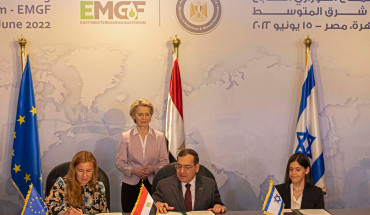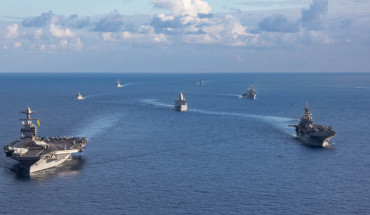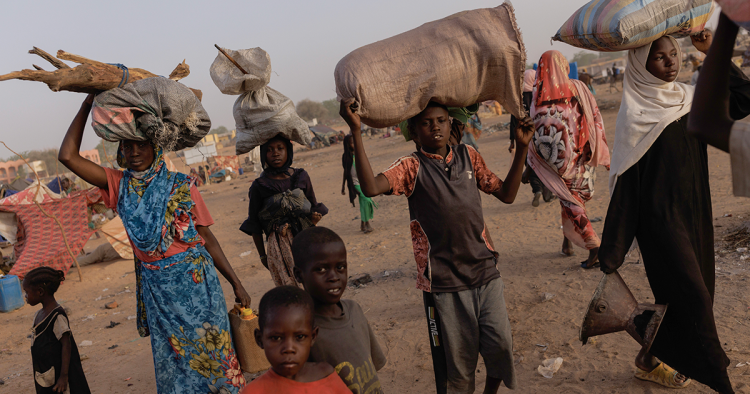Since April 15, 2023, the Sudanese people have borne the brunt of the country’s civil war. According to the Norwegian Refugee Council, more than 9 million people have been internally displaced over the past year, and another 1.7 million have been forced to flee to neighboring states. The World Food Programme estimates that nearly 18 million people are facing acute food insecurity due to the worsening conflict.
Peace remains a distant prospect, as a result of the failure of diplomatic efforts to date to convince both Abdel Fattah al-Burhan, head of the Sudanese Sovereignty Council and commander of the Sudanese Armed Forces (SAF), and Mohamed Hamdan Dagalo (known as “Hemedti”), commander of the paramilitary Rapid Support Forces (RSF), to end the conflict through a political settlement. This is not for lack of trying in recent months though: High-level talks were held in Manama in January; Abdul Hamid Dbeibah, prime minister of the Libyan National Unity Government, offered to mediate between the two sides in February; the US has been pushing to resume negotiations in Saudi Arabia this spring; and back-channel talks are currently ongoing in both Cairo and Juba.
While Burhan and Hemedti accepted Dbeibah’s mediation offer earlier this year, this was a largely tactical move aimed at gaining regional and international legitimacy, even as they continued to fight one another. Both military leaders want to keep the option of mediation open until the timing is right for a favorable political dialogue, after one force has significantly weakened the other, paving the way for a safe exit for one side and a political and military victory, as well as control of Sudan’s post-conflict transition, for the other. In essence, neither Burhan nor Hemedti wants to use the process to reach a power-sharing agreement similar to those signed in 2019 or 2021; instead, they want an arrangement that paves the way for a new authoritarian regime headed by the victor.
Background of the conflict
At the start of the conflict, both Burhan and Hemedti believed it would end swiftly, with one of them eliminated and unable to take part in any future transition. That explains why neither side honored the cease-fire agreement signed during the Jeddah talks in May 2023.
Hemedti and the RSF believed that a lightning victory was possible, as a result of the RSF’s strong position in strategic areas of Khartoum, which they thought would aid the capture of Burhan and other senior SAF generals. This was in line with their efforts to promote Hemedti’s image as a protector of the transition period, which began with the ousting of Sudan’s long-term authoritarian leader Omar al-Bashir in 2019, to support his presidential ambitions.
Meanwhile, Burhan and his supporters believed that the SAF’s air superiority, artillery, and heavy military machinery would be enough to quickly defeat the RSF. Importantly, they also thought they could undermine the morale of the RSF by calling on SAF officers seconded to the paramilitary force to abandon it — and indeed some 480 of these officers did return to the SAF.
However, as the war dragged on for weeks, and then months, the open involvement of regional and international backers on both sides has complicated matters. On the side of Hemedti and the RSF, the support of the United Arab Emirates has been apparent, with the UAE’s humanitarian deliveries to Sudan via Chad allegedly covering for its supply of arms to the RSF. Burhan and his allies also view Ethiopia and Kenya as allies of the RSF, after both countries called for the intervention of the Eastern Africa Standby Force and the implementation of a no-fly zone in Khartoum during an Intergovernmental Authority on Development (IGAD) summit in June 2023. This had a significant political impact, effectively denying the SAF the opportunity to quickly defeat the RSF and thus giving Burhan and his allies the legitimacy to lead Sudan. At the same time, Ethiopia and Kenya allowed the Forces of Freedom and Change (FFC), the civilian coalition that Burhan and Hemedti ousted from power through their coup on Oct. 25, 2021, to organize in both countries in order to gain international legitimacy. There are indications that some leaders within the FFC are inclined toward Hemedti and the RSF.
On the side of Burhan and his allies, Egypt has provided political support and held a summit in July 2023 calling on regional countries not to intervene in Sudan. According to Nazar Abdelaziz, secretary-general of the Broad National Front coalition, Cairo also sent its air force to attack RSF positions in Khartoum. In addition, reports suggest that Iran has sent Burhan drones to be used as precision weapons to combat the RSF’s hit-and-run tactics. Burhan reportedly intends to use the threat of Iran to spark the UAE’s fear of losing access to the Red Sea if it continues to support Hemedti and the RSF. The UAE has been building up its influence in the Red Sea in recent years, to encourage the United States to view it as the go-to partner in the region, giving it significant political and military sway in both the Middle East and Africa.
Political calculations
As mentioned above, Hemedti and Burhan have accepted mediation offers to bolster their legitimacy at home and abroad, both of which are in short supply.
The RSF has focused on repairing its image internationally, especially with the US and its Western allies. This marks a shift in Hemedti’s approach from posing as the defender of Sudan’s transition to democracy more broadly to having a clear political program as the war has dragged on. This shows he is willing to change his agenda in line with developments on the battlefield and due to pressure from the international community.
As a result, Hemedti shifted the focus of his messaging from seeking to capture Burhan and other members of the former regime at the start of the conflict to calling for political dialogue to end the fighting, to allow him to be a partner in a new transition period under a federal system. He wants to be part of any future transition as he harbors presidential ambitions, aims to protect his economic interests, and seeks immunity from prosecution for ordering RSF troops to attack peaceful pro-democracy demonstrators in Khartoum on June 3, 2019, killing more than 100 protesters
The clearing of the Khartoum protest site tarnished the image Hemedti had been seeking to build since the RSF arrested former President Bashir in April 2019. Since then, Hemedti has tried to pose as a peacemaker by concluding the Juba Peace Agreement in 2020, which integrated the armed movements that challenged Bashir into the transition government, and focused on establishing close relations with the FFC by endorsing its constitutional declaration in 2022.
This shift also came about after RSF forces went on a rampage in Sudan’s cities and towns. The violence in Khartoum itself resulted in the displacement of millions of its residents to neighboring cities and towns as well as the looting of national heritage sites like the National Museum of Sudan and the historical archives. In Darfur, the RSF was accused of killing thousands of members of the Masalit, an indigenous tribe, in attacks that UN monitors said “may amount to war crimes and crimes against humanity” as well as forcefully displacing 500,000 people from Darfur into Chad. In addition, accusations have also been levelled against the RSF for looting and pillaging civilian homes as well as sending stolen goods across the border into Chad.
The RSF also faces operational constraints. While its hit-and-run tactics have proved effective in enabling it to seize territory and expand its control, it does not have the financial and military capabilities to sustain a long war, especially as its front companies al-Junaid Conglomerate, GSK Advanced Company, and Tradive are now internationally sanctioned.
For Burhan, the war supports his bid to gain political legitimacy by claiming to represent the state, bolsters his presidential ambitions, and furthers his efforts to secure immunity from prosecution for ordering the clearing of the Khartoum protest site in June 2019. Burhan wants to reach a political settlement with Hemedti after significantly weakening the RSF, rather than outright defeating it, with the aim of taking over a weakened RSF to use it to protect himself from a potential coup by former regime elements. Burhan had previously played it safe and had the SAF focus on defending its positions from the RSF, rather than going on the offensive.
In addition, Burhan also faces the prospect of a court martial from the SAF after the end of the war for outsourcing its role to his then-ally Hemedti and using the RSF to protect strategic sites — a move that backfired badly when the conflict broke out. Burhan has already faced several coup attempts, most notably one spearheaded by Gen. Abdalbagi Bakrawi and the SAF officers of the armored corps in September 2021, reportedly sparked by discontent with Burhan’s perceived favoritism toward the RSF. As a result of his reliance on the RSF before the war, Burhan removed article 5 of the RSF Act, making it a separate entity from the SAF rather than being under its control. He also allowed the RSF to expand its size from 20,000 soldiers in 2019 to 100,000 soldiers before the war.
The fight for legitimacy
Burhan’s participation in diplomatic initiatives allows him to capitalize on the progress the SAF has made in recent months in capturing successive positions from the RSF in Omdurman. The recent breakthrough in retaking Radio Omdurman, the national radio and TV headquarters, gives a major boost to both Burhan and the SAF, bolstering the legitimacy of his leadership, after he only reluctantly allowed the SAF to abandon its defensive posture to attack RSF positions. Mid-ranking officers and soldiers were unhappy with Burhan’s defensive strategy, which enabled the RSF to gain significant territorial control at the SAF’s expense. The RSF also used the mediation efforts in Jeddah as an opportunity to continue to attack SAF positions and expand to other areas, such as al-Jazira state, which the RSF captured in December 2023.
Burhan’s change in strategy comes as a result of his inability to use IGAD to gain legitimacy as Sudan’s head of state. Originally, he sought to use the eight-country African trade bloc to achieve his formula for a political settlement to end the conflict in Sudan. That is why Burhan accepted IGAD’s invitation to hold an emergency session on the conflict in November 2023, reportedly believing he had co-opted both Kenya and Ethiopia — IGAD’s two powerbrokers — to drop their objections to the idea that the war should end through a military solution first, and then a political one. This disagreement, along with other issues, eventually contributed to Sudan suspending its membership in IGAD in January 2024.
For his part, Hemedti wanted to use the IGAD initiatives to force Burhan and his allies to acknowledge him as a partner in a transition process and to maintain the RSF’s independence from the SAF. He intentionally delayed meeting with Burhan to travel to Uganda, Rwanda, Kenya, and Ethiopia, in an effort to bolster his regional credibility first. Hemedti also signed a political declaration with Taqaddum, the civilian coalition formed by former Prime Minister Abdalla Hamdok in October 2023, and the FFC, which Hemedti and Burhan ousted in their October 2021 coup, to position himself and the RSF as credible negotiators looking to end the conflict in Sudan. These political maneuverings have encouraged both sides to use initiatives that are ostensibly intended to end the conflict to instead bolster their political legitimacy, both regionally and internationally.
Conclusion
While it is possible that the conflict will end with victory for one side or the other — a development that would likely pave the way for a new authoritarian regime in Sudan no matter which side wins — the international community, especially the US and its allies, can challenge this prospect by supporting Sudan’s civilian movement. To this end, they could implement the UN arms embargo to stop the flow of weapons and ammunition reaching the RSF through Darfur, call out those countries that do not abide by the embargo, and pressure the SAF’s regional allies to stop supporting it with arms as well. Recent comments by US officials underscoring the urgent need to halt the supply of arms to all parties in the conflict are a step in the right direction, but more needs to be done to maintain pressure on both the SAF and the RSF to stop this war and allow a credible civilian movement to form an interim government, oversee a transition process, and then hand over power to a democratically elected successor.
At the same time, the civilian movement Taqaddum also has a responsibility to do its part to end the civil war and bring about a credible interim government. Having the FFC parties hold internal leadership elections would be a step in the right direction and would go a long way toward helping the coalition to regain its credibility. Some FFC members are seen as close to Hemedti and the RSF, which both Burhan and his allies among members of the former regime have used as ammunition to undermine any hopes among Sudanese of a real transition to democracy.
Jihad Mashamoun is a Sudanese researcher and a political analyst on Sudanese affairs.
Photo by Dan Kitwood/Getty Images
The Middle East Institute (MEI) is an independent, non-partisan, non-for-profit, educational organization. It does not engage in advocacy and its scholars’ opinions are their own. MEI welcomes financial donations, but retains sole editorial control over its work and its publications reflect only the authors’ views. For a listing of MEI donors, please click here.













